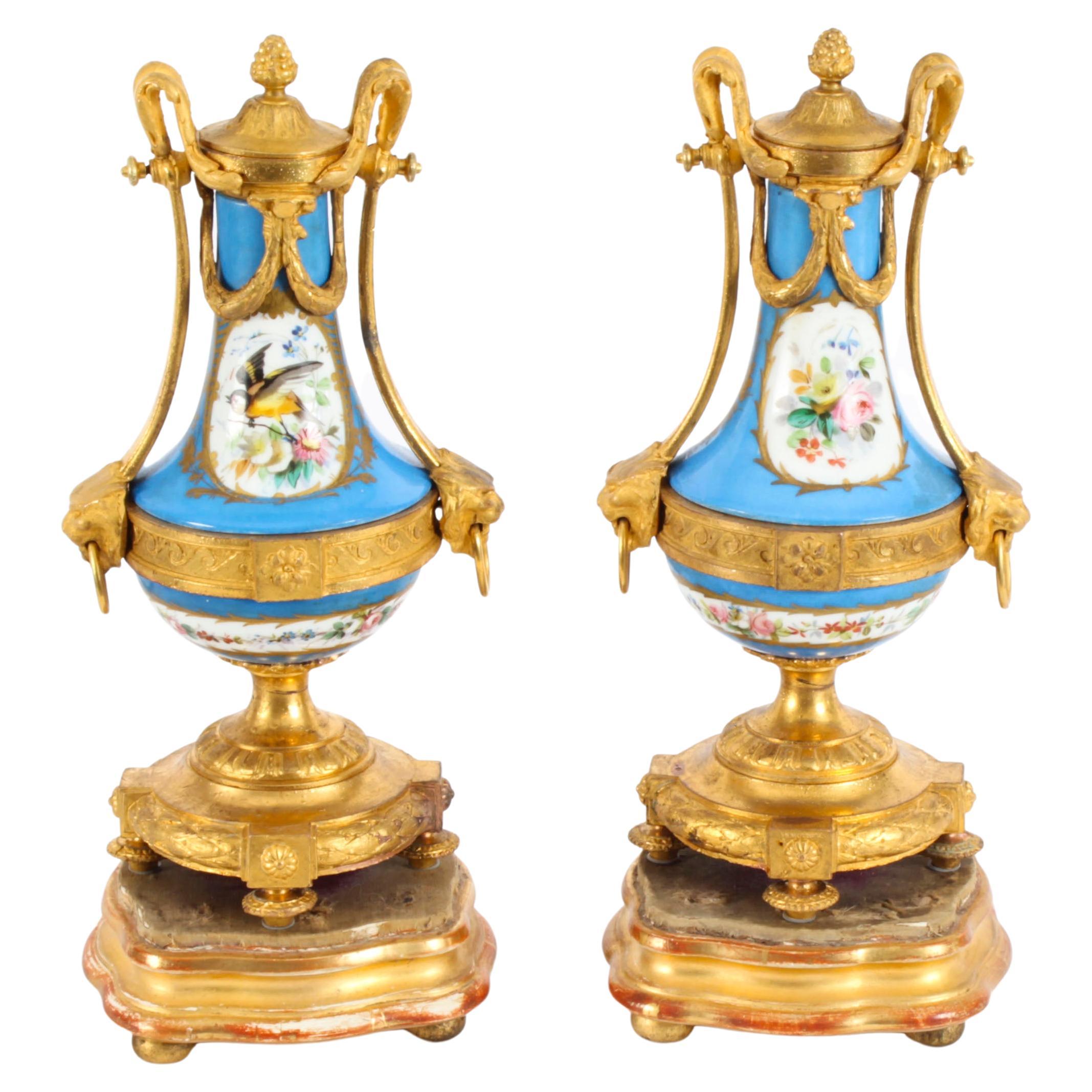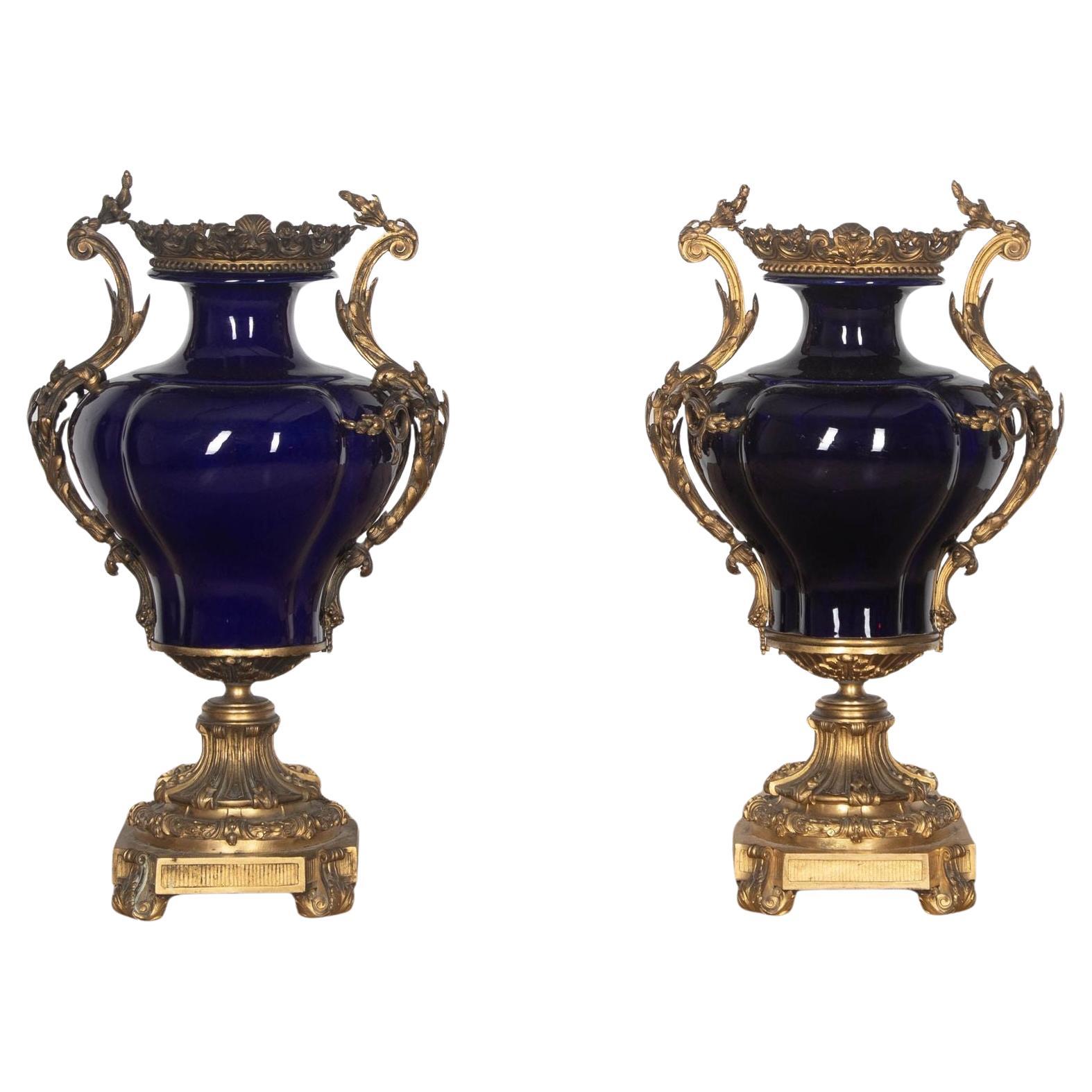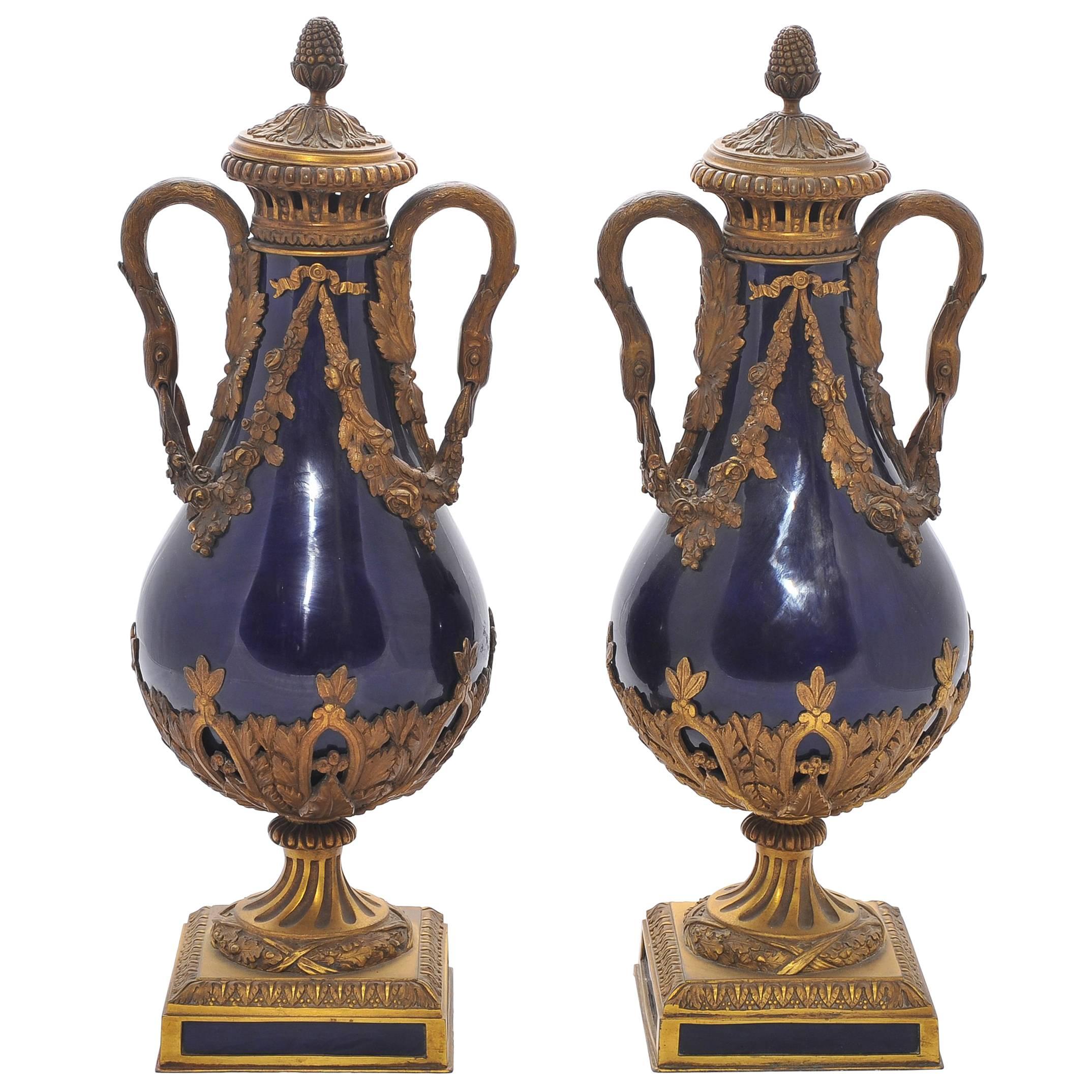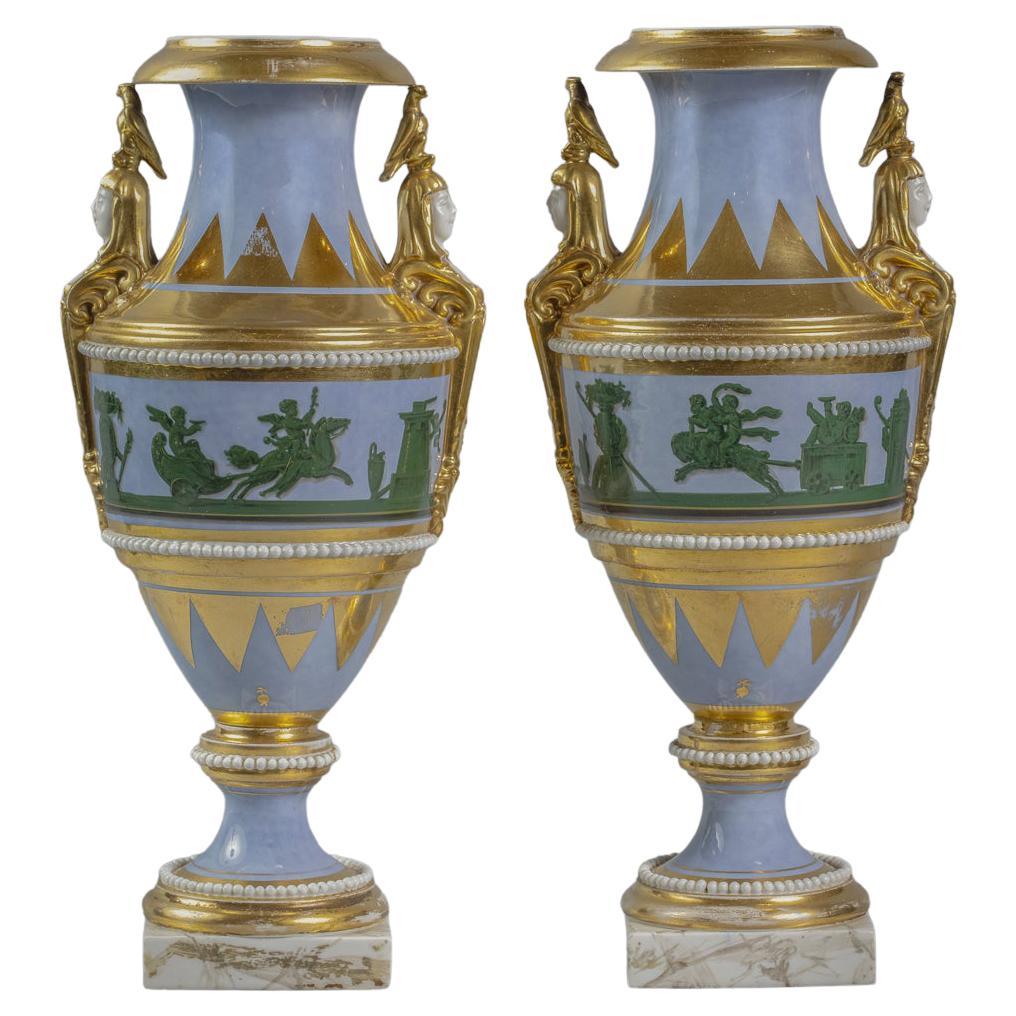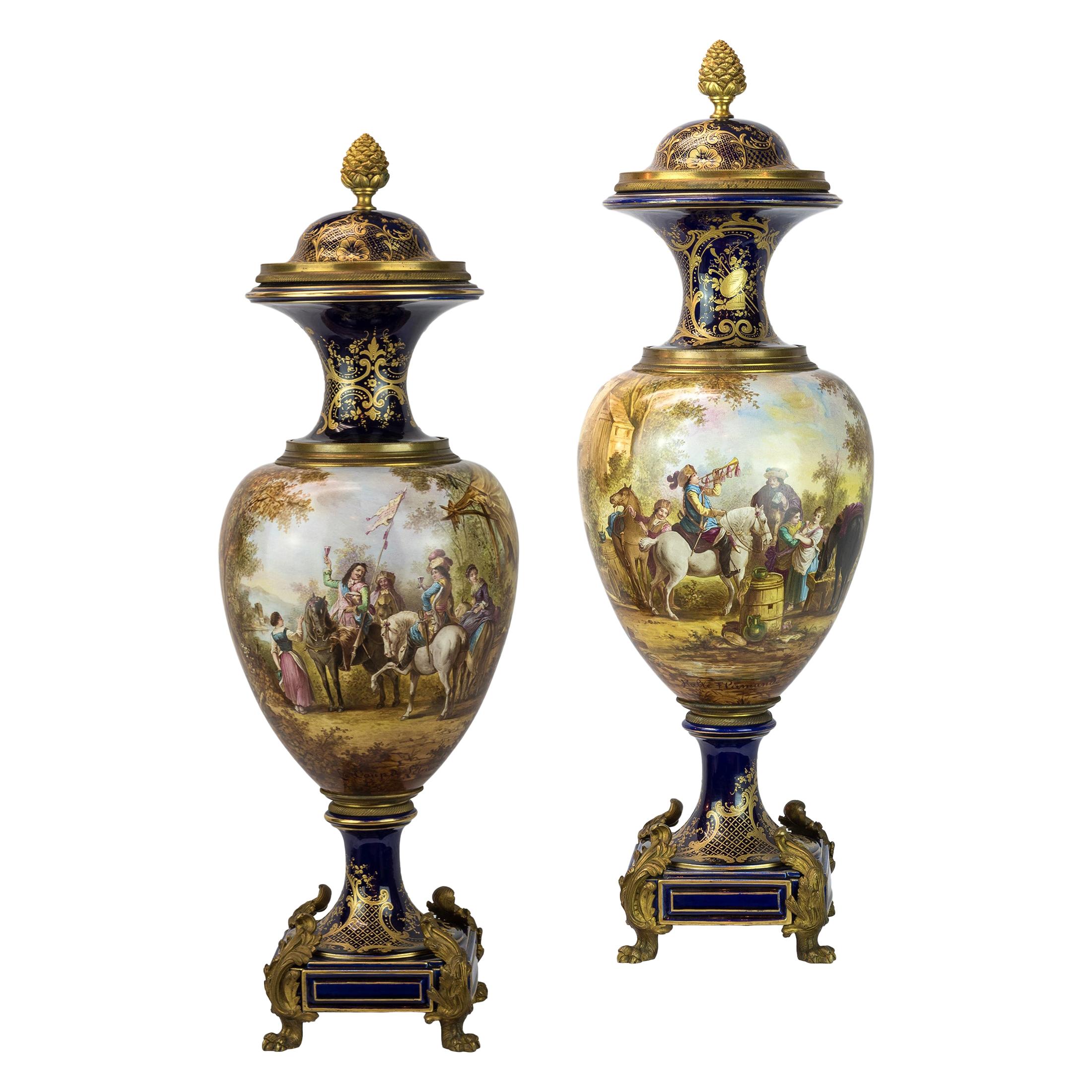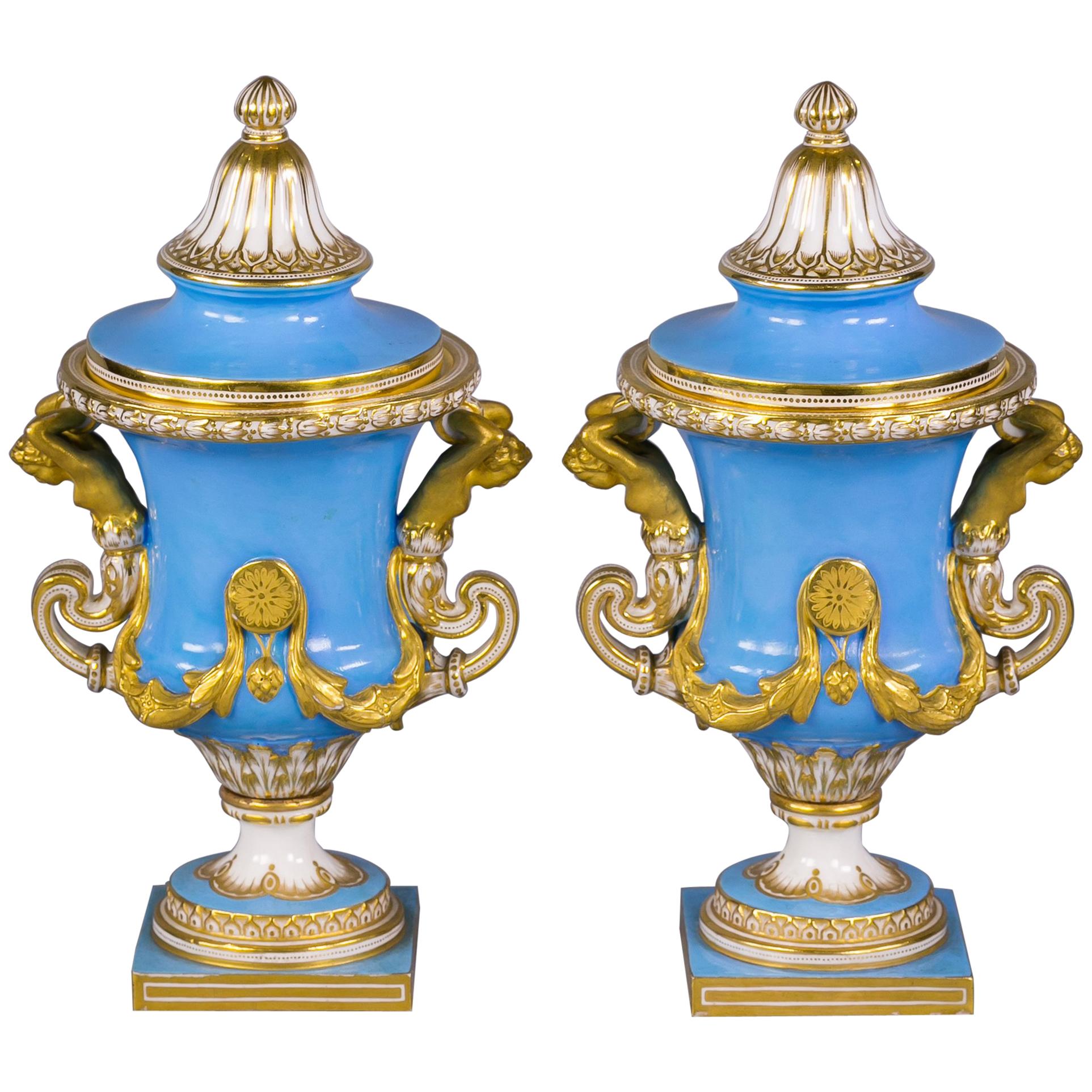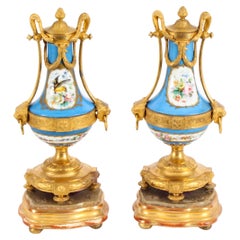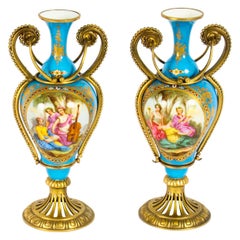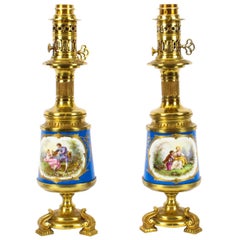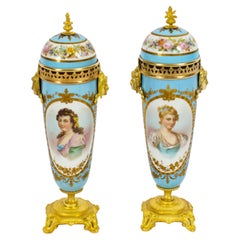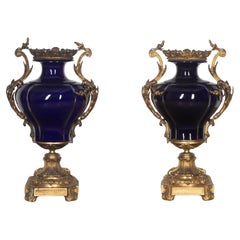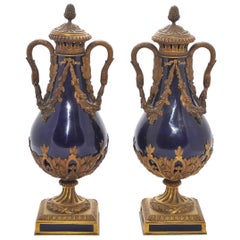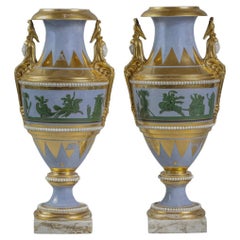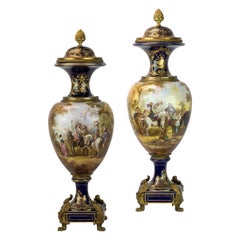Items Similar to Antique Pair of French Bleu Celeste Porcelain Urns 19th Century
Video Loading
Want more images or videos?
Request additional images or videos from the seller
1 of 22
Antique Pair of French Bleu Celeste Porcelain Urns 19th Century
$2,684.01per set
£1,950per set
€2,285.71per set
CA$3,664.19per set
A$4,076.26per set
CHF 2,136.82per set
MX$49,810.86per set
NOK 27,209.80per set
SEK 25,614.26per set
DKK 17,061.99per set
Shipping
Retrieving quote...The 1stDibs Promise:
Authenticity Guarantee,
Money-Back Guarantee,
24-Hour Cancellation
About the Item
This is a fine and rare antique pair of French porcelain ormolu mounted twin handled urns in the Sevres manner, dating from Circa 1860.
The decorative twin handle vases are superbly decorated with high-quality hand painted panels of romantic domestic scenes on one side and landscapes on the verso, on a bleu celeste and richly gilded ground with red jewelled borders , the handles formed as serpents.
There is no mistaking the quality and unique design of this pair of urns which is sure to be a treasured addition to your home.
Condition:
In excellent condition with no chips, cracks or signs of repair, and only minor signs of wear comensurate with age and use, please see photos for confirmation of condition.
Dimensions in cm:
Height 22 x Width 13 x Depth 9
Dimensions in inches:
Height 9 inches x Width 5 inches x Depth 3 inches
Sevres Porcelain traces its roots in France to early craftsmen who had small manufacturing operations in such places as Lille, Rouen. St. Cloud, and most notably Chantilly. It is from Chantilly that a cadre of workers migrated to the Chateau de Vincennes near Paris to form a larger porcelain manufactory in 1738.
French King Louis XV, perhaps inspired by his rumoured relationship with mistress Madame de Pompadour, took an intense interest in porcelain and moved the operation in 1756 to even larger quarters in the Paris suburb of Sevres. Sevres was also conveniently near the home of Madame de Pompadour and the King's own Palace at Versailles.
From the outset the king's clear aim was to produce Sevres Porcelain that surpassed the established Saxony works of Meissen and Dresden. Though the French lacked an ample supply of kaolin, a required ingredient for hard-paste porcelain (pate dure), their soft-paste porcelain (pate tendre) was fired at a lower temperature and was thus compatible with a wider variety of colours and glazes that in many cases were also richer and more vivid. Unglazed white Sevres Porcelain "biscuit" figurines were also a great success. However, soft-paste Sevres Porcelain was more easily broken. Therefore, early pieces of Sevres Porcelain that remain intact have become rare indeed.
The Sevres Porcelain manufactory always seemed to be in dire financial straits despite the incredibly fine works it produced. In fact, the king's insistence that only the finest items be created may have contributed to the difficulties. Only a limited number of European nobility could afford the extravagant prices demanded for such works. King Louis XV and eventually his heir, the ill-fated Louis XVI, were obliged to invest heavily in the enterprise. Ultimately, the Sevres Porcelain Factory produced items under the name of "Royal" and thus the well-known Sevres mark was born. King Louis XV even mandated laws that severely restricted other porcelain production in France so as to retain a near monopoly for his Sevres Porcelain. The king even willingly became chief salesman for the finest of his products, hosting an annual New Year's Day showing for French nobility in his private quarters at Versailles. He eagerly circulated among potential buyers, pitching the merits of ownership and policing the occasional light-fingered guest.
Sevres Porcelain may have indeed given the makers of Meissen and Dresden a run for their money by the end of the 18th Century but for the French Revolution. By 1800, the Sevres Porcelain Works were practically out of business due to the economic devastation of the new French Republic.
About the time when Napoleon Bonaparte named himself Emperor of France (1804), a new director was named for the Sevres Porcelain Manufactory. Alexandre Brongniart, highly educated in many fields, resurrected Sevres Porcelain. Soft-paste porcelain was eliminated altogether thanks to the earlier discovery of kaolin near Limoges. For four decades until his death, Brongniart presided over monumental progress for Sevres Porcelain, catering not only to Napoleon himself, but at last to include the more financially profitable mid-priced market in the emerging middle class.
Ormolu (from French 'or moulu', signifying ground or pounded gold) is an 18th-century English term for applying finely ground, high-carat gold in a mercury amalgam to an object of bronze.The mercury is driven off in a kiln leaving behind a gold-coloured veneer known as 'gilt bronze'.
The manufacture of true ormolu employs a process known as mercury-gilding or fire-gilding, in which a solution of nitrate of mercury is applied to a piece of copper, brass, or bronze, followed by the application of an amalgam of gold and mercury. The item was then exposed to extreme heat until the mercury burned off and the gold remained, adhered to the metal object.
No true ormolu was produced in France after around 1830 because legislation had outlawed the use of mercury. Therefore, other techniques were used instead but nothing surpasses the original mercury-firing ormolu method for sheer beauty and richness of colour. Electroplating is the most common modern technique. Ormolu techniques are essentially the same as those used on silver, to produce silver-gilt (also known as vermeil).
Our reference: A2804.
- Dimensions:Height: 8.67 in (22 cm)Width: 5.12 in (13 cm)Depth: 3.55 in (9 cm)
- Sold As:Set of 2
- Materials and Techniques:
- Place of Origin:
- Period:
- Date of Manufacture:circa 1860
- Condition:
- Seller Location:London, GB
- Reference Number:Seller: A28041stDibs: LU950630682122
About the Seller
5.0
Platinum Seller
Premium sellers with a 4.7+ rating and 24-hour response times
Established in 1983
1stDibs seller since 2012
1,374 sales on 1stDibs
Typical response time: <1 hour
Associations
LAPADA - The Association of Arts & Antiques Dealers
- ShippingRetrieving quote...Shipping from: London, United Kingdom
- Return Policy
Authenticity Guarantee
In the unlikely event there’s an issue with an item’s authenticity, contact us within 1 year for a full refund. DetailsMoney-Back Guarantee
If your item is not as described, is damaged in transit, or does not arrive, contact us within 7 days for a full refund. Details24-Hour Cancellation
You have a 24-hour grace period in which to reconsider your purchase, with no questions asked.Vetted Professional Sellers
Our world-class sellers must adhere to strict standards for service and quality, maintaining the integrity of our listings.Price-Match Guarantee
If you find that a seller listed the same item for a lower price elsewhere, we’ll match it.Trusted Global Delivery
Our best-in-class carrier network provides specialized shipping options worldwide, including custom delivery.More From This Seller
View AllAntique Pair French Bleu Celeste Sevres Urns 19th C
Located in London, GB
This is a beautiful antique pair of French Sevres style porcelain and ormolu mounted twin handled urns, in the Louis XV manner, Circa 1870 in date.
The bleu celeste...
Category
Antique 1870s French Urns
Materials
Ormolu
Antique Pair of French Ormolu Mounted Bleu Celeste Sèvres Vases, 19th Century
Located in London, GB
This is a beautiful antique pair of French Louis Revival Sèvres "Bleu Celeste" porcelain and ormolu mounted twin handled vases, circa 1880 in date.
They are superbly decorated in ...
Category
Antique 1880s French Vases
Materials
Ormolu
Antique Pair of French Bleu Celeste Sèvres Vases Lamps, 19th Century
Located in London, GB
This is an exquisite large pair of French Sèvres Porcelain and ormolu mounted oil burning table lamps that have been skillfully converted to electricity ...
Category
Antique 1870s French Porcelain
Materials
Ormolu
Antique Pair French Duck Egg Bleu Sevres Urns 19th C
Located in London, GB
This is a beautiful antique pair of French Sevres porcelain twin masque head handled lidded urns with dome lids, in the Louis XV manner, Circa 1870 in date.
The vases with a duck...
Category
Antique 1870s French Urns
Materials
Porcelain
Antique Pair Coalport Vases Cobalt Blue by A Perry 19th C
Located in London, GB
A superb pair of Coalport twin handled vases, late 19th century in date.
The painted shaped panels feature handpainted landscapes with birds set within shaped cartouches by A Perry,...
Category
Antique Late 19th Century Vases
Materials
Other
Antique Pair Dresden Porcelain Pot Pourri Lidded Vases 1920s 20th C
Located in London, GB
This is a beautiful antique pair of fine quality Dresden porcelain pot pourri urns and covers, circa 1920 in date.
Each painted with harbour scenes on a patterned ground and bearing underglaze blue AR marks.
They are beautiful objects which will look fabulous in all surroundings.
Condition:
In really excellent condition with no chips, cracks or signs of repair, and only very minor signs of wear comensurate with age and use, please see photos for confirmation of condition.
Dimensions in cm:
Height 41 x Width 23 x Depth 17
Dimensions in inches:
Height 1 foot, 4 inches x Width 9 inches x Depth 7 inches
Dresden porcelain - A King's Obsession
In the early 1700s, King Augustus II, prince elector of Saxony, held goldsmith Johann Bottger prisoner and commissioned him to create gold. Bottger instead discovered the method of creating porcelain, a favored and valuable item in the king's eyes.
The king announced to Europe in 1710 that he would open a porcelain manufactory in Dresden. He instead opened one at nearby Albrechtsburg castle. Espionage was rampant, and the king guarded his porcelain secret, even though it meant imprisoning workers within the castle walls.
By 1720, the secret was leaked and porcelain producers popped up in Vienna and Venice. Dresden porcelain adopted Saxon crossed swords in under-glaze blue as its distinguishing mark.
In 1736, the porcelain manufactory produced the "Swan Service...
Category
Vintage 1920s Porcelain
Materials
Porcelain
You May Also Like
Pair of 19th Century Quality Blue Ceramic and Ormolu Vases
Located in Gloucestershire, GB
Pair of 19th Century French, quite stunning, blue ceramic vases.
Decorated with ormolu and brass decoration that make this beautiful pair of vases stand out from the crowd.
Circa 1860.
Category
Antique Mid-18th Century French Urns
Materials
Brass, Ormolu
Pair of 19th Century Sèvres Blue, Ormolu Vases
By Manufacture Nationale de Sèvres
Located in Brighton, Sussex
A good quality pair of 19th century Sèvres Royal blue porcelain vases, each with classical gilded ormolu lids, handles and bases.
Category
Antique 19th Century French Ceramics
Materials
Ormolu
$10,963 / set
Pair of Paris Porcelain Powdered Blue Vases, circa 1820
Located in New York, NY
The central frieze silouetted in dark green animal with gilt details with cavoting putti, set within a beaded border, the collar and stem also applied with beads, the handles with bi...
Category
Antique 1820s French Vases
Materials
Porcelain
19th Century Pair of Sèvres Style Ormolu-Mounted Cobalt Blue Porcelain Vases
Located in New York, NY
A very Fine pair of Sèvres style ormolu-mounted gilt bronze cobalt blue porcelain bases.
Each with waisted neck decorated with gilt on cobalt blue and above a tapering ovoid body pa...
Category
Antique 19th Century French Vases
Materials
Ormolu
Pair of French Porcelain Gilt and Sky Blue Covered Urns, Sevres, circa 1860
Located in New York, NY
With adorned caryated figures as handles.
Category
Antique 1860s French Vases
Materials
Porcelain
Pair French 19th C. Ormolu & Sevres Porcelain Celeste Blue Jeweled Covered Vases
By Manufacture Nationale de Sèvres
Located in New York, NY
A Marvelous and Quite Large Pair of French 19th Century Ormolu Mounted Sevres Porcelain Jeweled Celeste Blue Ground Covered Vases with Four Main Panels. Each vase of baluster form w...
Category
Antique 1870s French Louis XVI Porcelain
Materials
Bronze
$35,960 Sale Price / set
20% Off
More Ways To Browse
Large Glass Urns
French Metal Urn
18th Century Sevres Porcelain
Paris Porcelain Gold And White
French Silver Vermeil
Brass Urn With Handles
Sevres Porcelain Napoleon
Limoges France Unique
Large Silver Urn
Red Sevres
White And Gold Sevres Porcelain
French Glass Brass Vase
Sevres Porcelain Limoge
Meissen Figurines 19th
Meissen Red
Meissen Figurines 19th Century
Royal Limoges
Sevres Porcelain 1860
